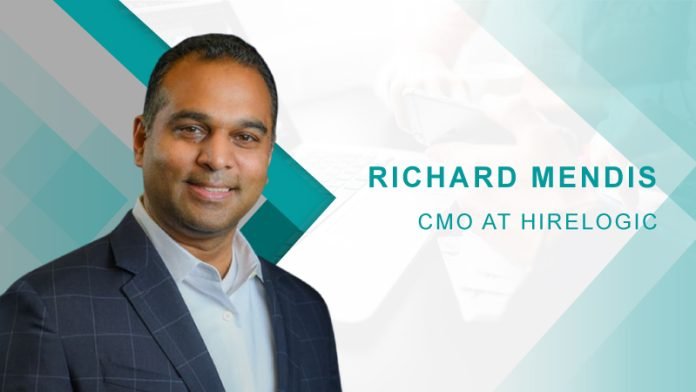Richard, could you please provide a brief overview of your professional journey leading to your current role as CMO at HireLogic?
With more than 25 years of experience in enterprise software, I have worked in leadership roles at both large corporations and venture-funded startups. Before joining HireLogic, I served as the Chief Strategy Officer at BrandMuscle. Leading up to that role, I was the VP of Marketing at TIBCO via the acquisition of Nanoscale.io, a company I co-founded, and VP of Solution Management at SAP via the acquisition of Clear Standards, which I also co-founded.
Two and a half years ago, a former colleague from our startup days convinced me to pursue the exhilarating journey with HireLogic. Our mission is to pioneer the integration of AI and machine learning into the burgeoning field of interview intelligence, revolutionizing talent acquisition and recruiting. Even before the official launch of ChatGPT, it was evident that AI would significantly influence various software categories, particularly in human resources technology. The prospect of utilizing AI to address critical issues like fostering more equitable hiring practices resonated with me, and I took the leap to be CMO at HireLogic.
Explain how HireLogic helps clients apply a data-driven approach to the hiring processes and how you’ve used it at your own company.
HireLogic helps our clients seamlessly incorporate a data-driven approach into their hiring processes using AI and conversational analytics to make informed decisions at every stage of the hiring journey. The platform reduces bias and bottlenecks in the hiring process by listening to interviews and auto-generating objective candidate data, ultimately leading to better, faster hiring.
We’ve been using our own technology to hire for various roles since we closed our Series A round of funding in early 2023. Our entire business was founded on the premise of using technology to improve the hiring process with more data-driven, objective information. We embody that ethos by using HireLogic to interview all our candidates and make decisions based on the information we glean from the system. We’ve built an incredible team and haven’t experienced the typical hiring-related growing pains that startups commonly deal with because the HireLogic platform helps us better define roles, find the right candidates, and saves us a lot of time.
Have you observed any measurable impacts since adopting a data-driven approach, and how has interview intelligence influenced hiring decisions for some of HireLogic’s customers?
The time-saving aspect of using interview intelligence is substantial. Our research has shown that using HireLogic leads to more than an 80% reduction in note-taking and saves recruiters hundreds of hours per month. Some clients have even reported that they’ve stopped taking notes altogether because HireLogic does such a thorough job at it that they feel comfortable just engaging with the candidate. The efficiency gains result in decisions being made twice as fast because you don’t have to wait for every stakeholder to summarize the interview, manually enter their notes in an application tracking system (ATS), and share key takeaways with the rest of the team.
Using interview intelligence over an extended period of time also helps yield better hiring outcomes for our clients through better candidate re-discovery and higher placement rates for those in the staffing and recruiting industries. The platform also helps reduce compliance risk by detecting potential EEOC violations, with the average customer uncovering areas for improvement in approximately 10% of interviews.
How is HireLogic continuing to advance its interview intelligence technology?
We’re continuously developing new interview intelligence capabilities that help companies make better, faster hires while avoiding bias. Currently, we’re focused on introducing a HireLogic AI Chatbot that enables talent acquisition and hiring managers to ask specific questions about candidates and get answers based on insights from interviews. This capability is being expanded to include resumes and job descriptions, for holistic candidate discovery.
What best practices would you recommend for organizations looking to adopt a data-driven approach to interviews?
The best practices I recommend for organizations looking to adopt a data-driven approach to interviews include:
● Ask good questions. You can leverage HireLogic or another generative AI solution to help create relevant questions for the role you’re hiring for. As you interview candidates, follow the same structure and set of questions to ensure consistency and make it easier to draw comparisons from the data.
● Invite an interview intelligence solution to listen in on every single interview. That way, you can automatically collect objective data on every candidate conversation and use it to support hiring decision-making. Plus, you can leverage that interview data for candidate rediscovery later on.
● If the interview intelligence flags a potential compliance violation, use it as a learning opportunity for your team. Not everyone is a natural interviewer, but taking the time to review compliance feedback after an interview can help hiring managers better navigate candidate conversations in the future and reduce the potential for bias in the hiring process.
Describe the challenges HR teams face when adopting AI solutions like interview intelligence. How can teams effectively overcome these challenges?
The biggest hurdle is often just adoption and comfort. Team members may feel apprehensive and resistant to adopting new technology in general, but there’s heightened concern around AI solutions due to fears about job displacement or changes in traditional workflows. HR leaders must be communicative about the fact that while AI may change some employees’ roles and responsibilities over time, it’s not meant to replace human decision-making.
When it comes to adoption, introducing interview intelligence is actually very easy. There’s no training or learning curve to using the technology during candidate interviews. You simply invite HireLogic to any Zoom, Teams, or Google Meet call via an email invite, or conference in a HireLogic phone number for phone interviews. After the interview, you receive an intelligent synopsis of the conversation and a summary of the candidate’s potential strengths and weaknesses via email. The platform has a free version, so it’s totally frictionless and risk-free to try it.
Drawing from your experience, what practical advice would you offer to organizations that are struggling with long hiring processes, poor candidate experiences, or the ability to make quality hires?
Poor candidate experiences often come from a lack of communication. No organization intentionally leaves candidates in limbo without communication about the status of their application. Rather, it occurs because there are bottlenecks in the hiring process. Either one of the hiring managers hasn’t provided feedback, hasn’t had time to debrief, or just can’t decide whom to move forward with because they’re having a hard time deciding between their top candidates’ potential strengths and weaknesses and breadth of experience. What happens all too commonly is that by the time the hiring team is ready to extend an offer, top candidates have often found a new role because they tend to get multiple offers and go with the one that came sooner. So, elongated hiring processes, poor candidate experience, and the ability to make quality hires are all interconnected. These challenges can be mitigated by using AI to automatically gather insights and use that data to make hiring decisions quicker.
What do you foresee as future trends in integrating data-driven approaches into hiring and recruitment, if you don’t mind sharing your insights?
In the future, I believe hiring and recruitment will become even more data-driven and shift toward a Q&A/ virtual assistant model that users are already very familiar with. Hiring managers and recruiters will have the ability to ask for help comparing candidates in a chat-like interface, or even running virtual screening interviews with agents based on rich candidate profiles. Instead of having to use simplistic keyword searches to find candidates within their database and evaluate them one by one, they can simply ask the chatbot which candidates best meet the criteria for the particular role. The chatbot will then respond based on machine learning models trained on data from the job descriptions, resumes, and past interviews to identify the top candidates who are objectively the best fit for the role. Of course, this type of technology must keep up with emerging regulations around AI. Chatbots used for hiring purposes should not provide subjective information and should never replace human decision-making.
Lastly, what advice would you offer to young marketing and HR professionals aspiring to make an impact?
Marketing professionals must learn how to adapt to this new world of generative AI, which is even impacting creative jobs. They must learn how to use content generation tools to their advantage by finding the right balance of using AI content as a starting point and supplementing it with original thought that will differentiate their brand in the marketplace.
HR professionals have to understand how AI is going to transform both talent management and recruiting as well as the labor market as a whole so that they can understand the impact of AI in the industries they hire for. Keeping up with local, state, and federal guidelines is a must so that they can be cognizant of the legal and ethical aspects of AI adoption in their organization.
And for both professions, the more data you can apply to your processes and decision-making, the better outcomes you’ll have.
Explore HRtech News for the latest Tech Trends in Human Resources Technology.

Richard Mendis CMO at HireLogic
Richard Mendis is the CMO at HireLogic. He has more than 20 years of experience in the enterprise software industry and currently works on AI solutions to help companies hire smarter and faster.












